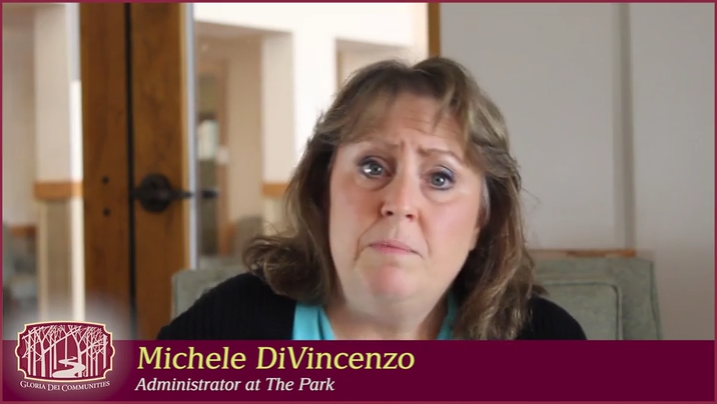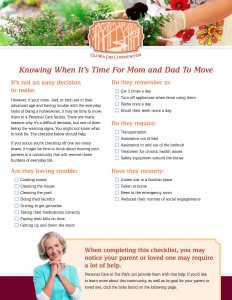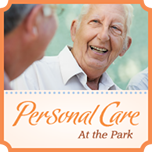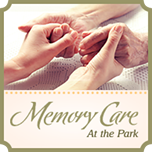“Our [medical] services that we provide here on campus, we do run through a medical model, so that means we have licensed nurses on duty 24 hours a day, which is a bit of an anomaly out in the industry at the personal care level. We also only have certified nurses aids here, and we also have dementia care practitioners. Everyone is certified and has that extra piece of education, that we have brought in to make sure that we’re prepared to care for someone that comes to us, that has needs.
In our independent setting, that’s precisely what it is. You do your cooking, you do your cleaning, you go out. Here at The Park, you can have your independence. You can go out and do what you want and come and go as you please. But we’ve afforded you the supportive services that sometimes people need that they can’t get in the independent setting.”
Michele DiVincenzo
Administrator, Memory Care at The Park and Personal Care at The Park
“Putting the families and the residents at ease. Giving them the piece of mind that they need to be able to make that transition. To instill in them a confidence in us, that we know, we’ve been doing this for a very long time, and that they know that we look at it as a team approach to the care of their loved one. You’re not going to be dropping off your family member and then not know what’s going on going forward. We’re here, you’re going to be seeing the same faces every day, if you have a concern we’ll answer it, we’ll take care of it, and that we’re for not only your family member, but we’re here for the family too.”
Michele DiVincenzo
Administrator, Memory Care at The Park and Personal Care at The Park
“We want to instill peace of mind to our families and to the residents. In essence, we have your back. We’re going to make sure that your needs are met, and we’re going to take care of you. We’re going to do it in a loving and nurturing environment. That’s really our philosophy.”
Michele DiVincenzo
Administrator, Memory Care at The Park and Personal Care at The Park
Gloria Dei Communities is actively interviewing our community leaders to provide you with a comprehensive Video Q & A. Please, check back at a later date for the final product. Or if you have any specific questions you’d like to enter to us, make sure you click here.
Like us on Facebook to follow more of our posts.
The winter months can be challenging for anyone. The cold can really deplete our willpower to get up and moving. Plus, the lack of sunlight can drain our positive energy. Unfortunately, we’re not like bears, so we can’t just hibernate through these months. It’s important, especially for seniors, to be as active as possible and to prevent isolation. Below are some tips to remain physically and mentally healthy during the winter.
Dress Appropriately
It may seem obvious, but even temperatures indoors can drop below your level of comfort. Clearly you don’t want to be outside in shorts and a t-shirt. Make sure you’re wearing a winter coat with a hat to cover your ears and gloves to keep your fingers warm. However, as stated previously, take note of the temperature indoors. You might find yourself growing uncomfortable, which is why it’s crucial to dress in layers even when you’re inside. This keeps your body temperature from dropping too quickly and provides you with the extra benefit of being able to shed a few layers if you grow too hot. It’s a win-win!
Stay Social
Seasonal Affective Disorder (SAD) is a type of depression that hits us when the seasons change. It’s fairly regular to experience a drop in your mood around late fall and early winter. The lack of sunlight can really take a toll on us. You might experience low energy and irritability during this time. However, it’s important to shed those feelings. You must resist the urge to isolate yourself and make sure you’re taking time out of your day to talk to your loved ones or spend some time with close friends. This will help boost your mood and prevent SAD from becoming a more permanent form of depression.
Keep Active
Another way to beat the “winter time blues” is to remain active. We know that this can be difficult to accomplish when all you want to do is remain tucked in with a nice blanket by a cozy fireplace. But by staying active, you’re certainly doing yourself a favor. This is due to endorphins. They’re the chemical that gets released from your brain during and after a strenuous workout. They help remove pain and give you a feeling of pleasure and satisfaction, in order to help eliminate any negative thoughts you might be having about the winter. Not to mention, by staying active, you’re tiring out your body, so you can sleep even sounder during the night. That way you can wake up refreshed and ready to take on the day!
Watch Your Diet
We tend to stay in more during the winter months. As a result, our diets become a little less healthy, due to the fact that take out foods and frozen dinners are a little less healthy than your standard home cooked meal. If the weather allows it, make sure you’re still frequenting the grocery store to pick up fresh fruits and vegetables, as well as lean meats to prepare for your meals. Keep your diet well varied in the winter months, because it can become a little bland if we only eat the snacks in our cupboard. If this occurs, your body might become a little deficient due to a deficiency in nutrients. Always make sure you’re maintaining a well-balanced diet!
The best way to achieve all four of these tips is to ask for help! There’s certainly no shame in asking a friend to accompany you to the gym or asking a loved one to take you to the grocery store. The winter time can be a rough few months with shorter days and colder nights. OR it can be a time to see more of your family and friends and a chance to be more active. The choice is yours!
As the winter months approach and all of the festive holidays begin to occur, our diets can take a turn for the worse. Overindulging in carbs and sweets is certainly not a new tradition during November, December, and January. However, gaining excess weight and skipping workouts for even just a few weeks can have a negative impact on your overall health. It’s tough to find the proper balance between comfort food and a proper diet. Luckily, the tips below can help you!
Natural Sweetness
Processed sugar is bad for you. Really bad for you. It’s refined from sugar cane and added to almost everything you eat. It’s devoid of all nutrients and raises your blood sugar levels quickly, so one minute you’re feeling energized and the next you’re in need of a nap. It’s best to reduce the amount of processed sugar you consume each day.
That means you need to find a healthier alternative to all the sugar you’ll be adding to your pies, cakes, and cookies this holiday. You can supplement some of the sweetness by using a more natural ingredient such as vanilla extract, cinnamon, or nutmeg. Whatever you think would work best for the recipe! Even a touch of honey or molasses could do the trick.
Cut the Fat
It’s tough to reduce the amount of butter or shortening in a recipe, because that sweet and salty taste is such a staple for most delicious baked foods. You might be thinking there’s no way it’ll still taste delicious by cutting out half of the fat needed in the recipe. However, healthy alternatives like vegetable oil, applesauce, or making a sweet potato puree as a substitute yields very positive results. You’re not reducing the flavor, you’re just adding some extra flare to it.
Another area where you can reduce the amount of fat in cooking is the milk you choose. By opting for skim milk instead of whole milk, you’ll be doing yourself and everyone else who’s eating your treats a service!
Lower Your Sodium
Fresh ingredients are tastier than prepackaged condiments. Instead of using tons and tons of ketchup, trying slicing up fresh tomatoes and making a salsa. Pickles taste great, but they’re very high in sodium content. A cucumber will provide that perfect crunch you’re looking for in a sandwich without half of your daily intake of salt.
When cooking, leave the salt in the cupboard. Instead, reach for the fresh herbs and spices to include in your cooking. It’ll leave it tasting fresher, while reducing the strain on your heart. Delicious and healthy don’t have to be mutually exclusive. You can have both! And that’s exactly what you should strive for this holiday season.
We went pink in October to promote awareness for Breast Cancer Awareness Month. In November, we need to change that color to purple. It is the color of choice for National Alzheimer’s Disease Awareness Month! Last year, we wrote an article about spreading awareness. This year we want to help you recognize the signs and symptoms of the disease. It’s important to note, however that it’s nearly impossible to diagnose the disease without seeing your doctor. If your loved one is experiencing any of the signs and symptoms below, it does not necessarily mean they have dementia or Alzheimer’s disease. It just means they should get checked out.
- Memory Loss
It’s one of the most common signs of Alzheimer’s disease. However, it’s also pretty common for those who don’t have Alzheimer’s disease. We all walk into a room and occasionally forget why went there. That’s technically not memory loss. What we’re talking about here is the kind of memory loss that disrupts daily life. If your parent or loved one is forgetting important dates or asking for the same information over and over again, then there might be cause for alarm. Forgetting what they were looking for in the fridge is not the same thing as forgetting a loved one’s birthday or even their name. - Completing Familiar Tasks
This is similar to symptom number two. Putting together IKEA furniture is tricky. However, remembering the rules to your favorite game or cooking an extremely familiar recipe should not be a difficult task. If you notice a loved one having difficulty preparing an old family recipe or even paying their bills on time, it may be time that they see their doctor. - Confusing Time and Dates
It’s okay to think it’s Thursday when it’s actually Friday. That’s quite common. What’s not okay is if your parent or loved one thinks it’s 2006 when it’s 2016. Confusing dates and years is a sign of Alzheimer’s disease. It’s possible for your loved one to forget where they are on the timeline. They may also get confused when it comes to time of day. They may think it’s the morning when it’s the evening or vice versa. - Unable to Join in or Continue Conversation
Alzheimer’s disease affects connections in the brain, so holding a conversation can be very difficult. One minute your loved one may be speaking perfectly fine and the next they’re struggling to figure out what they were saying previously. This may also be a symptom of Aphasia, however. A disorder that affects the brain as well, but can get better over time, unlike Alzheimer’s disease. Therefore, if your parent or loved one is experiencing symptoms such as the ones stated above, make sure they see a doctor. He or she will be able to determine the problem and develop a plan from there. - Misplacing Items
A person who does not have Alzheimer’s disease will misplace an item from time to time. We all lose things. However, a person with Alzheimer’s disease will, not JUST misplace an item, but leave that item in an unusual place. Missing keys may be found in the refrigerator or the milk may be found in the cupboards. If you notice a parent or loved one who is misplacing items in random locations, they may need to see their doctor.
Know the Signs and Then Take Action
We want to reiterate that you alone cannot diagnose Alzheimer’s disease. It takes the work of medical professionals to perform numerous tests and procedures to determine if something, if anything, is wrong with your loved one. However, that does not mean you should ignore issues when they arise. If you notice a loved one experiencing any of the symptoms above, schedule a doctor’s appointment for them. That way, you can celebrate National Alzheimer’s Disease Awareness Month the right way!

























